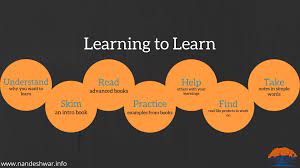The Importance of Learning Skills
Learning skills are essential tools that empower individuals to acquire knowledge, develop competencies, and adapt to new challenges. Whether in academic settings, professional environments, or personal pursuits, honing learning skills can significantly enhance one’s ability to succeed and thrive.
Adaptability
One of the key benefits of learning skills is the ability to adapt to changing circumstances. In a rapidly evolving world, being able to learn quickly and effectively is crucial for staying relevant and competitive. Individuals with strong learning skills are better equipped to embrace innovation and navigate unfamiliar situations with confidence.
Critical Thinking
Learning skills also foster critical thinking, enabling individuals to evaluate information, solve problems, and make informed decisions. By developing analytical abilities and logical reasoning, learners can assess complex issues from multiple perspectives and arrive at well-founded conclusions.
Self-Development
Furthermore, learning skills contribute to personal growth and self-improvement. Continuous learning not only expands knowledge but also enhances self-awareness, creativity, and resilience. By investing in their development, individuals can unlock their full potential and achieve greater fulfilment in various aspects of life.
Collaboration
In collaborative settings, strong learning skills facilitate effective communication, teamwork, and mutual understanding. By cultivating a culture of shared learning and continuous improvement, teams can leverage diverse perspectives and talents to achieve collective goals efficiently.
Lifelong Learning
Ultimately, learning skills are the foundation for lifelong learning – a mindset that embraces curiosity, exploration, and growth throughout one’s life journey. By fostering a passion for continuous education and skill development, individuals can adapt to evolving demands and seize opportunities for personal and professional advancement.
In conclusion, investing in learning skills is a valuable investment in oneself. By cultivating adaptability, critical thinking, self-development, collaboration, and a commitment to lifelong learning, individuals can enrich their lives and make meaningful contributions to society.
Understanding and Enhancing Learning Skills: Key Questions Answered
- What are learning skills and why are they important?
- How can I improve my learning skills?
- What are the different types of learning skills?
- Are learning skills essential for academic success?
- How do learning skills benefit professional development?
- Can learning skills be developed at any age?
What are learning skills and why are they important?
Learning skills encompass a range of abilities and strategies that enable individuals to acquire knowledge, process information effectively, and apply learning in various contexts. These skills include critical thinking, problem-solving, time management, communication, and self-regulation. They are essential because they empower individuals to adapt to new challenges, think critically, make informed decisions, collaborate effectively, and continue growing throughout their lives. By honing learning skills, individuals can enhance their personal development, succeed in academic and professional pursuits, and navigate the complexities of an ever-changing world with confidence and resilience.
How can I improve my learning skills?
To improve your learning skills, it is essential to adopt effective study habits, such as setting specific goals, creating a conducive learning environment, and managing your time efficiently. Additionally, actively engaging with the material through methods like summarising key points, practising retrieval of information, and seeking feedback can enhance comprehension and retention. Embracing a growth mindset that values perseverance and continuous improvement is also crucial in developing strong learning skills. Remember to stay motivated, stay organised, and seek support from educators or peers when needed to maximise your learning potential.
What are the different types of learning skills?
Understanding the different types of learning skills is essential for enhancing one’s ability to acquire knowledge effectively. Various categories of learning skills include cognitive skills, such as critical thinking and problem-solving, which enable individuals to process information and make informed decisions. Additionally, there are metacognitive skills that involve self-regulation and reflection, allowing learners to monitor their progress and adjust their strategies accordingly. Social skills play a vital role in collaborative learning environments by promoting effective communication, empathy, and teamwork. Furthermore, practical skills encompass hands-on abilities like time management, organisation, and study techniques that support efficient learning practices. By recognising and developing these diverse types of learning skills, individuals can optimise their learning experiences and achieve greater success in their educational and professional pursuits.
Are learning skills essential for academic success?
Learning skills are undeniably essential for academic success. Mastering effective learning strategies such as time management, note-taking, critical thinking, and problem-solving not only enhances students’ ability to absorb and retain information but also equips them with the tools needed to excel in their academic pursuits. By developing strong learning skills, students can navigate complex subjects more efficiently, approach assignments with confidence, and ultimately achieve higher levels of academic performance. Additionally, these skills lay a solid foundation for lifelong learning and continuous growth beyond the classroom, making them indispensable for achieving success in both academic and professional endeavours.
How do learning skills benefit professional development?
Learning skills play a pivotal role in enhancing professional development by equipping individuals with the tools and capabilities necessary to excel in their careers. The ability to learn efficiently and effectively enables professionals to adapt to changing industry trends, acquire new competencies, and stay ahead in a competitive job market. Strong learning skills facilitate continuous growth and improvement, empowering individuals to enhance their problem-solving abilities, critical thinking skills, and decision-making processes. By investing in learning skills, professionals can unlock new opportunities for advancement, broaden their knowledge base, and achieve greater success in their chosen fields.
Can learning skills be developed at any age?
The question of whether learning skills can be developed at any age is a common inquiry among individuals seeking to enhance their abilities. The answer is a resounding yes – learning skills are not restricted by age but rather flourish through continuous practice and dedication. Regardless of one’s stage in life, the capacity to acquire new knowledge, refine existing competencies, and adapt to novel challenges remains within reach. By embracing a growth mindset, nurturing curiosity, and engaging in purposeful learning experiences, individuals of all ages can cultivate and strengthen their learning skills to unlock new opportunities and realise their full potential.

